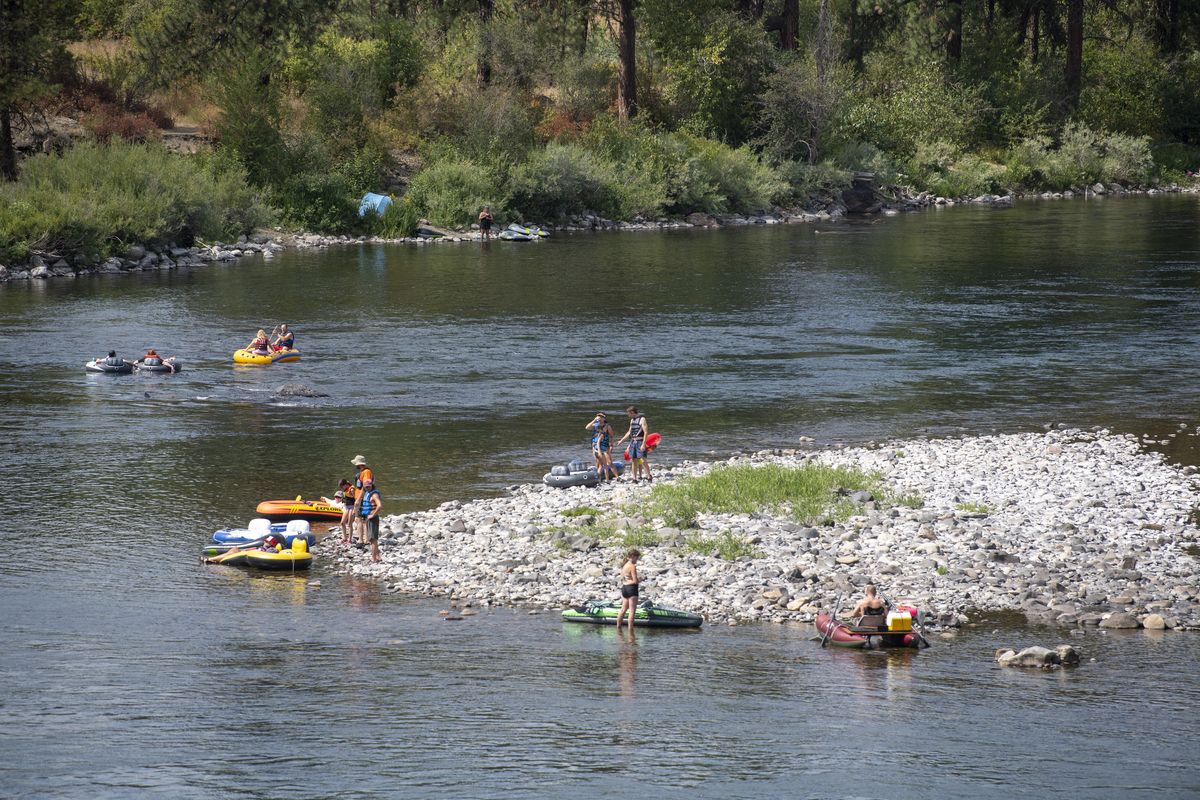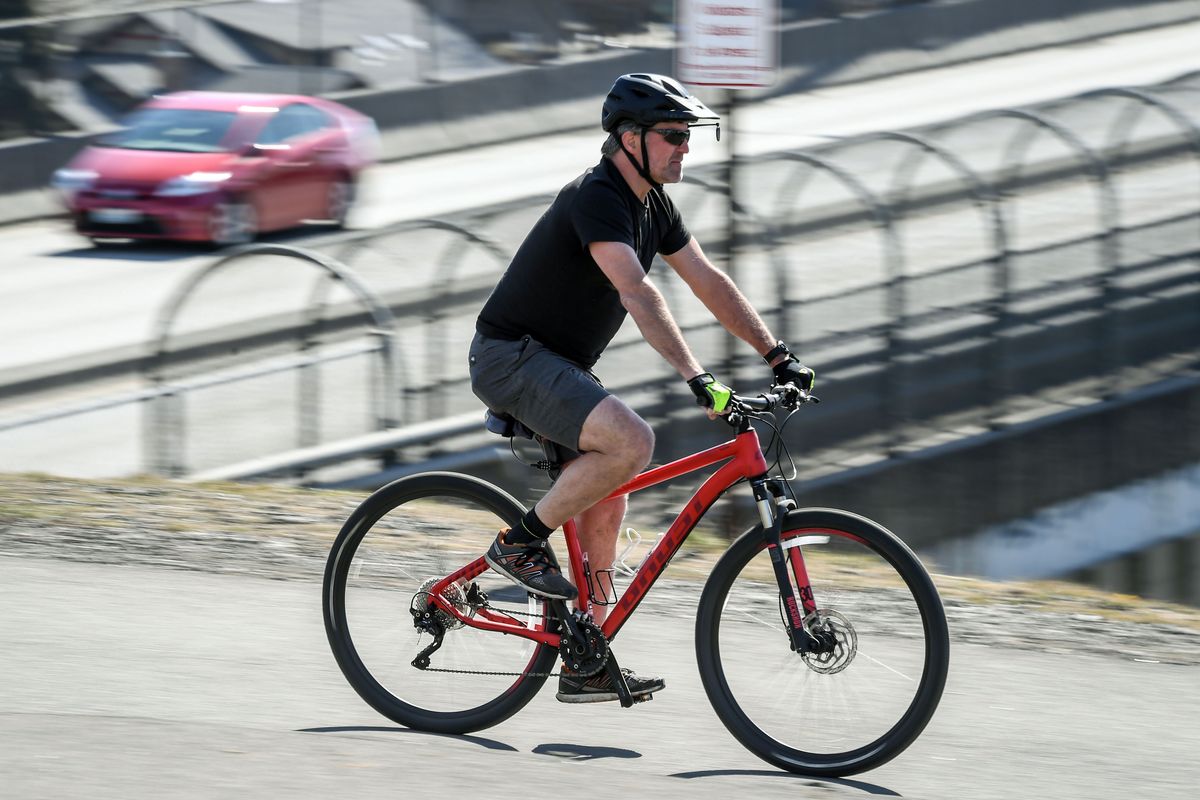House Call: Summer fun and summer safety in Spokane
Tubers prepare to leave High Bridge Park, west of downtown Spokane, on a hot day last August. Wear a life jacket when recreating on the area’s rivers and lakes. (Jesse Tinsley/The Spokesman-Review)Buy a print of this photo
Summer is in full swing, and with the reopening of Washington’s restaurants, bars, theaters and more in-person events, summer fun is in full swing, too. Especially this year as we get back out there, we need to dust off our summer safety reminders to stay healthy and safe.
Taking care of yourself and your kids means being able to enjoy all that Spokane summers have to offer for the whole season without a trip to the ER. With this in mind, I wanted to share some summer tips on safety. A few years ago, I had a personal vivid reminder of how small safety precautions make a big difference.
Biking happens to be one of my favorite summer passions. I went out for an early morning bike ride on a cool, crisp day a few years ago. It was early, roads were clear, and there wasn’t much traffic as I headed south on Dishman Mica Road.
I looked down for a split second and, suddenly, my bike hit a small piece of asphalt on the shoulder. My bike and I were instantly airborne. Before I had a chance to release my feet from the clips or let go of the handlebars, my head and shoulder were pancaked onto the pavement.
Fortunately, my helmet saved me from any serious head injury. I was able to complete a slow, painful ride back home. This episode was a stark reminder of the value of wearing a helmet. While biking, riding a scooter or skateboarding, to name a few examples, remember to wear a helmet. Wearing a bike helmet is the law in Spokane and required for kids throughout the county.
Here are additional tips for summer safety:
Soaking up sun safely
Overexposure to the sun can result in skin and eye damage. As I mentioned last month, skin cancer is the most common cancer in humans, but it’s also straightforward to protect yourself. Use a broad-spectrum sunscreen with a sun protection factor of at least 15-30.
Make sure it’s water-resistant when swimming or sweating, and reapply it frequently, at least every 2 hours. Just putting it on at the start of the day isn’t enough. In addition to sunscreen, a good pair of sunglasses is important. You’ll want to choose sunglasses that block at least 99% of UVA and UVB rays.
This can help minimize cataract development down the road as well as protect from drying wind or insect strikes. Polarized lenses are good protection when you are near the water, and you can get photochromic lenses that change with light conditions, too.
Stay hydrated
Heat-related illness are serious, particularly in children and the elderly. It’s easy for any of us to keep going and miss hydrating regularly, especially on longer outings. You need to hydrate well before starting out on an activity and drink regularly during, even before you feel thirsty.
Dehydration and heat exhaustion, as well as heat stroke, can escalate quickly, so take prevention seriously. Fluids with electrolytes are important on longer-distance treks. Learn to recognize the warning signs of dehydration: darker urine or less urine, dry mouth and swollen tongue, bad breath and sluggishness or fatigue, as well as mental fogginess or confusion.
Stop what you are doing and cool down and drink water immediately. If you are experiencing any of these symptoms, seek medical attention right away: confusion, dizziness, fainting or heart palpitations.
Obviously, warmer weather can accelerate these changes, as well as too much caffeine or alcohol, intense exercise and sunburn. The bonus is that being hydrated can keep you cool in hot Spokane summers and help your muscles and joints work at peak performance.
Getting outside safely
We’re all ready to get back out there – so don’t forget the basic steps you can take to take care. When hiking, bring the essentials, which can be found at your local outdoor shop, including a First Aid kit and navigation tools. You might want to also consider a small portable water filtration kit.
Learn about what to do if you encounter a cougar or bear – don’t run, make yourself large, and make loud noises. Cougars have been spotted in the greater Spokane area, and you could encounter one. If you hike or mountain bike, which they can perceive as fleeing prey, it’s a good idea to go with a friend in more remote areas such as Mica Peak and Tower Mountain.
More of us are exercising, hiking and camping solo since the pandemic changed some of our habits. If in the outdoors on your own, make sure you’ve let someone know where you are, bring the appropriate gear, and prepare for all contingencies, including sudden weather changes and temperature drops.
If you’re on the water, wear a life jacket on open water and pay attention to designated areas. More than 2 of 3 children who suffered a drowning incident were not expected to be swimming, yet were in water. Have a proper barrier near pools and a watchful eye. Learning to swim and teaching kids to swim is one of the best things we can do to stay safe around water.
Wildfire smoke
We’ve come to expect there will be wildfire smoke most summers, and last year, the hazardous air quality set records in the Inland Northwest. Exposure to wildfire smoke is particularly an issue if you work outdoors, are younger than 18 or older than 65, or have asthma, COPD or other lung diseases, chronic heart disease or diabetes.
When the air quality index gets in the red zone (151-200), I recommend people stay indoors as much as possible with vents and windows closed, and avoid vigorous outdoor activities, especially for those sensitive groups listed above.
AQI’s from 201-300 are considered very unhealthy for everyone, and above 300 is considered hazardous. You should definitely stay inside during these conditions. If you have lung disease, consult with your doctor about a mask with an N-95 or N-100 filter to filter out the damaging fine particles.
Use a portable air filter with a HEPA filter to keep air quality better in at least one room in your home, and consider skipping cooking inside and vacuuming, both activities that can reduce indoor air quality.
Roll up your car windows, and don’t exercise outside until the air quality improves. Set up an evacuation plan and have an emergency kit, including knowing what medicines you need to take if you must evacuate.
Take special precautions for kids as their lungs are still developing, and they are more susceptible to smoke. Also don’t forget to be cautious when you clean up after a wildfire smoke event – cleaning can kick up dust and soot, so use damp cleaners or wear a mask.
Summer gatherings
With most events reopening, summer picnics and parties, we’re gathering in person in a way we haven’t for quite some time. We have talked at length about COVID-19 infection risk, so the reminder here is we are not yet at the desired ideal vaccination rates to protect the community around us, as well as ourselves. Prudent decision-making around these events is still warranted.
Whether you’re getting out camping away from it all or enjoying summer in town, as you prep for your picnic, bike ride or swim, a few simple precautions can ensure a safe and enjoyable summer.
Dr. Jeff Markin is a family medicine physician practicing at Kaiser Permanente’s Veradale Medical Center.

